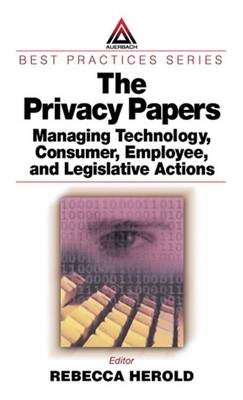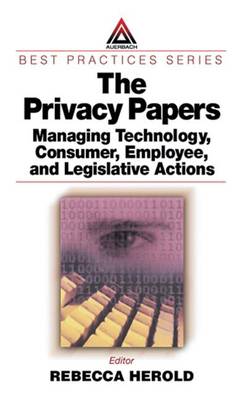
- Retrait gratuit dans votre magasin Club
- 7.000.000 titres dans notre catalogue
- Payer en toute sécurité
- Toujours un magasin près de chez vous
- Retrait gratuit dans votre magasin Club
- 7.000.0000 titres dans notre catalogue
- Payer en toute sécurité
- Toujours un magasin près de chez vous
182,45 €
+ 364 points
Description
Today, more than ever, organizations have to cope with increased concerns regarding privacy issues. These concerns are not limited to consumer fears about how information collected by Web sites will be used or misused. They also involve broader issues, including data collected for direct response marketing, privacy of financial and health records, identity theft, and fraud. Employees are raising questions about acceptable use of phones, e-mail, the Web, and if and when employers can monitor use. Employers find that without policies governing use of these assets, they have no legal basis for action against employees. The Privacy Papers: Managing Technology, Consumer, Employee, and Legislative Actions is a book for C-level executives, IT managers, HR managers, security officers, privacy officers, and legal professionals. It covers all aspects of technology and legislation that enable privacy and also those that place it at risk. This how-to guide presents sample policies for employee training, awareness, and acceptable use; covers why companies must protect data and how to do it; describes the technology that makes information more private; and lists and summarizes major federal and international privacy legislation. Corporate espionage can put sensitive company information such as intellectual property, product development, marketing plans, and customer files at risk. With the ever-increasing legislation concerning privacy, it is important for executives to stay up to date. The Privacy Papers will ensure that any company conducting business domestically or internationally will understand how policies governing use of their assets will affect daily operations.
Spécifications
Parties prenantes
- Auteur(s) :
- Editeur:
Contenu
- Nombre de pages :
- 708
- Langue:
- Anglais
- Collection :
Caractéristiques
- EAN:
- 9780849312489
- Date de parution :
- 20-12-01
- Format:
- Livre relié
- Format numérique:
- Genaaid
- Dimensions :
- 159 mm x 243 mm
- Poids :
- 1161 g

Les avis
Nous publions uniquement les avis qui respectent les conditions requises. Consultez nos conditions pour les avis.






